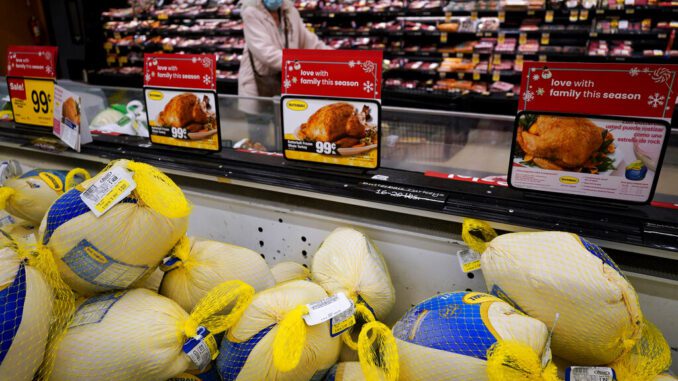
PORTLAND, Maine — With inflation raging and state coffers flush with cash, governors and lawmakers across the U.S. are considering a relatively simple solution to help ease the pain people are feeling at the gas pump and grocery store — sending money.
At least a dozen states have proposed giving rebate checks of several hundred dollars directly to taxpayers, among them California, Kansas and Minnesota. Critics, including many Republican lawmakers, say those checks won’t go far enough given the pace of inflation and are pushing instead for permanent tax cuts.
A proposal from Maine Gov. Janet Mills is among the most generous in a state where the cost of food and fuel has skyrocketed in recent months. The Democratic governor wants to send $850 to most residents as part of the state’s budget bill.
The rebate “will help Maine people grapple with these increased costs by putting money directly back into their pockets,” Mills said.
But Wendell Cressey, a clamdigger in Harpswell, said the soaring cost of fuel for people in his business means the check will provide just temporary relief.
“It might help a little, but it would have to be a lot more because we’re paying for gas. Most of us have V-8 trucks,” Cressey said. “I just don’t think it’s going to help as much as they think it is.”
In addition to the direct rebates, lawmakers and governors across the country are considering cuts to sales taxes, property tax relief and reducing or suspending state gas taxes.
The proposals come at a time when many states actually have historic amounts of money on their hands because of billions of dollars in federal pandemic aid and ballooning tax revenue. It’s also happening as the war in Ukraine has compounded soaring prices for fuel and other essentials.
It’s also no coincidence that the relief is being floated during an election year, said Mark Brewer, a political science professor at the University of Maine. “There’s some real policy reason to do this,” Brewer said. “But at the same time, it’s also clear that this is an election year, and in an election year there are few things as popular as giving voters what voters see as free money from the state.”
The states are moving toward sending people money as consumer inflation has jumped nearly 8% over the past year. That was the sharpest spike since 1982.
Inflation boosted the typical family’s food expenses by nearly $590 last year, according to the Penn Wharton Budget Model, a project of the University of Pennsylvania’s Wharton Business School. Overall, the average family had to spend $3,500 more last year to buy the same amount of goods and services as they purchased in previous years.
In New Mexico, some have questioned whether Democratic Gov. Michelle Lujan Grisham’s plan for a $250 rebate goes far enough given how much consumer prices have risen.
Wayne Holly and his wife, Penny, were among the small business owners in the state who were forced to shut their doors early in the COVID-19 pandemic because of the governor’s public health orders.
“Do we get customers who are angry and irate because things have changed? Yes, we sure do,” Wayne Holly said. “Do we get customers who say ‘I never used to pay that before?’ I say ‘Yeah, I’ve never paid $4.50 for a gallon of gas.'”
“State legislatures should not rush into enacting permanent tax cuts based on what very well might be temporary growth in real revenues,” Lucy Dadayan, senior research associate at the Urban Institute, wrote in a recent analysis.
The relief plans vary by state. Minnesota Gov. Tim Walz, a Democrat, released a plan for spending the state’s budget surplus that included a proposal for income tax rebate checks of $1,000 per couple. In California, Democratic lawmakers have released separate proposals to send rebates of $200 to $400 to each taxpayer, while Gov. Gavin Newsom said he wants to distribute fuel debit cards of up to $800 to help ease the burden on residents paying the highest gas prices in the nation.
Proposals for relief haven’t gone so smoothly in other states. Vermont Gov. Phil Scott, a Republican, has proposed returning half of a $90 million surplus in the state Education Fund to the state’s property taxpayers with a check of between $250 and $275, but the Democrat-controlled Legislature has shown little interest.
“Typically, when you overpay for something, you get some of that money back,” Scott said when he made the proposal earlier this month.
